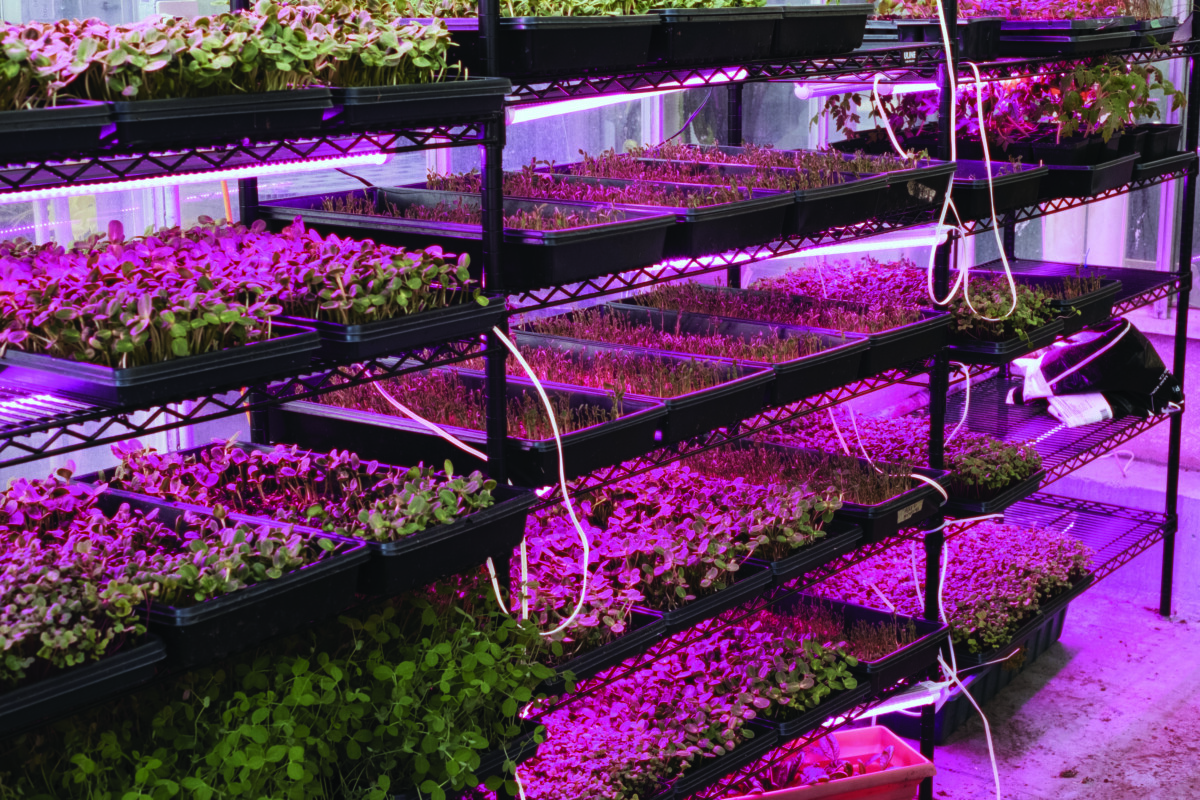How rooftop farms contribute to community resilience and food security.
On a rooftop nestled in the Plateau Mont-Royal, volunteers are hard at work, like bees buzzing around a garden. The rooftop is lush with greenery, growing fresh produce for the local community. Or at least it will be in a few weeks’ time.
Santropol Roulant is a non-profit organization that grows food on their building’s roof for the local community. They cook it in their kitchen, deliver the meals to those who need them most, and compost part of the scraps thanks to The Compost Collective’s worm farm in the basement.
“Initially, it was really like a kitchen and delivery program that focused a lot on youth volunteering,” said Adrienne Richards, the gardens and accessible agriculture coordinator at Santropol Roulant.
The Roulant was started by the team at Café Santropol on St-Urbain Street. They realized there was a need for a meals-on-wheels service that catered to isolated people, elderly people, people with accessibility issues, and others who don’t have access to sufficient quality food to meet their needs.
According to Richards, about half of their rooftop farm’s produce goes to their meals-on-wheels service, and they currently deliver about 100 to 120 meals per day to clients, referred to them by health and social workers.
The company MicroHabitat was co-founded in 2016 by Alexandre Ferrari-Roy and Orlane Panet in Montreal to promote ecological farming in urban areas. Their role is to help their clients green their buildings, whether they be industrial, commercial, or residential. While philanthropy came first at Santropol Roulant, gardening was the starting line for MicroHabitat.
The initial goal for MicroHabitat was simply to build ecological urban farms, but their focus shifted to food security when clients started donating their produce to local organizations.
“I was actually very happy and thrilled,” Ferrari-Roy said. MicroHabitat decided to facilitate the process for their clients by creating the Urban Solidarity Farms program. “It’s the bridge between them and the food banks,” he added.
The Urban Solidarity Farms help their clients donate their harvest to organizations like Accueil Bonneau, Dans La Rue, Le Chaînon, and others. Roughly half of their projects are aimed toward giving access to healthy and fresh herbs and vegetables to local food banks. MicroHabitat also donates part of their profit to the Breakfast Club of Canada and No Kids Hungry in the United States.
Ferrari-Roy explained that food banks often don’t receive fresh produce and normally only have access to lower-quality food or non-perishables. “We see the impact of our work when we’re donating,” he says. “It can definitely make someone’s life better to eat something fresh and tasty.”
While these rooftop farms give locals access to fresh and healthy produce, volunteers also benefit from the experience. “People are committed and willing to give so much of their time and energy because we’ve created a meaningful system,” Richards said.
Meanwhile, at Concordia University, the mind.heart.mouth initiative started by researcher Andrea Tremblay looks at gardening as a vessel to build community resilience. Tremblay quickly noticed positive impacts on volunteers through her doctoral research around the buzzing network of people tending to the garden.
Tremblay recalled a volunteer who was in cancer remission a few years ago who had never grown food before. When Tremblay saw a ripe cucumber on its vine, she decided to save it for her. “She told me she’d never seen a cucumber grow,” Tremblay said. “When I showed it to her, she just burst into tears and said that was the most beautiful thing she’d ever seen.”
The woman had been very shy until that moment, but everyone at the garden came to hug her. “It really sealed the small community of the garden,” Tremblay said, adding that people look forward to coming and look out for each other.
mind.heart.mouth collaborated with Concordia’s PERFORM Centre so physical therapy patients could participate in gardening to help their physical and mental health.
“Being in the garden and working towards growing food for food banks and community organizations is giving everybody in this garden a real sense of empowerment by contributing to the community,” Tremblay said.
Through her research, Tremblay learned that gardens are a great tool to create social opportunities and learn together in a safe and inclusive space while also contributing to food security.
“A garden is conducive to creating community,” Tremblay said. “You’re both just there to look for bugs and conversation is made easy.”
ALL PHOTOS OF THE CONCORDIA GREENHOUSE ARE TAKEN BY THOMAS VALLIANCOURT/THE CONCORDIAN
